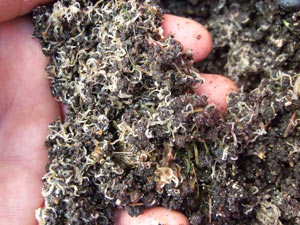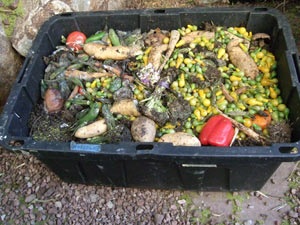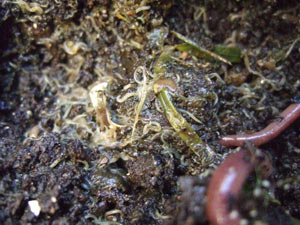Pot worms in your worm composting bin

Earlier this week I dug into my worm bin and saw hundreds of small white worms. I had been seeing more and more of these worms for a few weeks and was excited that I had so many baby red wigglers. But after a month they just didn’t seem to mature in to red worms and I got a little worried.
I did some research online and called a master gardener friend and it turns out that these aren’t baby red wigglers like I originally thought, it turns out they are a different kind of worm, called “potworms” or “pot worms.”
Although it’s disappointing that these little guys aren’t red wigglers, they are great to have in your worm bin. In fact, you’ll see them eating right alongside your red wigglers. Potworms do an incredibly good job breaking down your worm food and making great compost.
After learning more about these little white worms, I made a special bin where I keep the pot worms I take out of my regular red worm bins. I put acidic or fermenting food into this special bin.  The pot worms make a really rich soil that my plants love and it looks almost exactly like regular vermicompost except the soil is a lot finer.
The pot worms make a really rich soil that my plants love and it looks almost exactly like regular vermicompost except the soil is a lot finer.
Video of pot worms in my compost, bins and garden
I made you a video so you can see some of the things I’m talking about in this post.
What are these strange little white worms called pot worms?
Pot worms originally got their name when people discovered them in their potted plants. They are a harmless little worm closely related to red wigglers and earthworms. Pot worms belong to the family enchytraeidae.
Are pot worms a problem?
There are only two potential problems if there are lots of pot worms in your bin.
One is that they might out compete your red worms for food. This is unlikely, so unless they get way overpopulated, you can just let them be.

The second problem isn’t the pot worms themselves, it’s the conditions they thrive in: wet and acidic. If you’re seeing a lot of pot worms, your bin is probably too wet acidic, and an acidic bin can kill your red worms.
The simplest solution is to add coconut coir to absorb the moisture and buffer the pH. Also, you’ll want to cut back on acidic foods like coffee grounds, tomatoes, pineapple and citrus fruits.
How to catch pot worms
Pot worms love rich, organic soil and flock to fermenting (fermenting food is really acidic) food. I first noticed them in huge numbers when I fed my worms bread. As the bread started to ferment, the pot worms swarmed underneath the bread in a layer of moving white worms.
Another way to separate out pot worms that I’ve found really effective is to collect the dirt that has the most worms in it and put it in a small tub. Then break up the dirt and put it in a pile. The potworms will naturally go to the center of the pile and you can take them out in one big glob. This is exactly the way I collect them to put in my special pot worm bin. The video shows this really well.
If you have fish, you’ll find they love pot worms. You can bait pot worms by soaking a piece of bread in water or milk and waiting a few days for them to come to the bread. I find covering the bread with a piece of cardboard helps keep it moist, but the bread will wick moisture out of your worm bin too.

Are pot worms the same as Black Soldier Fly Larva?
Nope, not even close. Pot worms are tiny little worms in the Enchytraeidae family. Soldier flies are insects. Both are beneficial in a compost bin though, and if you have moderate amounts or either, leave them be. They are grrat for your soil. Ideally, you want living, breathing soil full of microbes, bacteria, insects and different kinds of worms.
Where do white worms come from? How do they get into the bin in the first place?
The white worms almost always come on bird’s feet, in soil you get at gardening stores, or from compost you put in your garden. They are very good for the soil and in other places are sold for gardens. You want these worms in your garden, you just don’t want so many you can make a marble out of all the ones in one spot. If that happens, they are overpopulated.